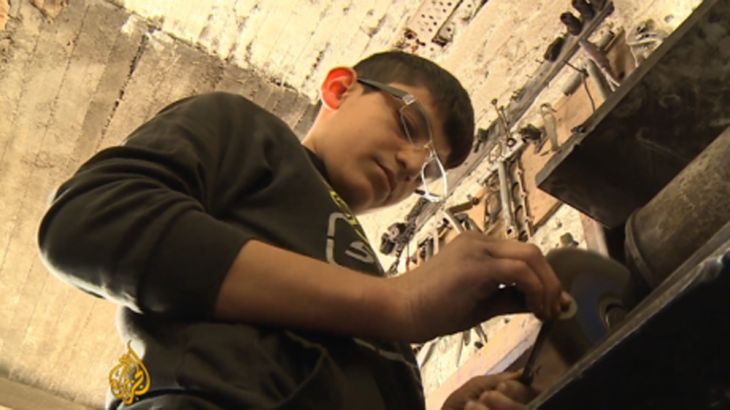Iraq’s Generation Uneducated
With two million children out of school due to war and displacement, many are forced to work to survive.

Erbil, Iraq – It’s almost like you can’t see them, but you know they are there.
You see them but you ignore them.
Keep reading
list of 4 itemsNigeria’s Tunde Onakoya sets global chess record with 60 hour nonstop game
Dozens of pro-Palestinian protesters arrested as Columbia clears encampment
Columbia University leaders face scrutiny over anti-Semitism on campus
They run up to your car and clean your windscreen. They offer to polish your shoes.
If you spend a long enough time in Erbil, in the Kurdish region of northern Iraq, you become accustomed to these little children offering services you didn’t want but now just accept as something you need.
I mean, who doesn’t like a freshly polished pair of shoes? A clean windscreen?
For many, these children aren’t useful.
They’re a nuisance as they flit around your car and office looking for a few dinars: small change to many but a meal to them.
As one friend put it to me, “Why aren’t they in school?”
Then he dismissed them with cold disdain.
|
|
I thought the same. Why aren’t they in school?
Then one night I sat with some members of UNICEF, the UN children’s organisation, and we talked about what they were doing.
One of them mentioned a statistic that floored me: two million children and adolescents are not able to go to school. Two million.
A quarter of the population of London, all without schooling.
A couple of days later I found myself in the industrial zone of Erbil.
Car wrecks and the smell of grease mixed with the hammering of steel and the high-pitched sound of whirring sanding tools.
On occasion the various noises would syncopate and form an odd melody, but most of the time it was a racket and mildly nauseating.
Tucked away in one of the workshops was one of those semi-visible children that we saw on the street.
Bahudin is around 12. I say around 12 because he doesn’t know.
I ask for his second name. Again I draw a blank. He doesn’t know.
He is from Kobane in Syria. He fled with his family in September 2014 when ISIL fighters took the town.
He wound up in a refugee camp in the Kurdish region and, from there, started to beg on the streets.
‘Dickensian adventure’
Like a lot of children Bahudin had a love of cars, and suddenly he found himself in the industrial zone racing from one mechanic to another, running errands for small change.
I miss my friends, I miss reading books about adventures and I really miss my home.
I asked him if he missed school.
“I miss my friends, I miss reading books about adventures and I really miss my home.”
I find his comment about adventures compelling.
Charles Dickens wrote about a street kid called Oliver Twist and his adventures.
I wonder what Dickens would make of Bahudin, a child who has run from the sharp end of one the most brutal armed groups on the planet, who now lives in a refugee camp and begs on the street before spending his day as an errand boy for car mechanics.
I think Bahudin would be oddly familiar to Dickens.
The boy’s life has been tumultuous.
To call it an adventure would be cheap, but the fact he misses reading about adventures is why he should be in school and not living this Dickensian adventure.
Instead he is here, sitting on a rubber car tyre wondering if he will make enough money to eat today. All because the world is divided over a solution to the Syrian crisis and the money to educate the two million children like him isn’t there.
As I leave him sitting on his tyre, I wonder about the long-term effects of a generation uneducated.
Whatever they are, they won’t be positive.
![Bahudin fled his home in Syria's Kobane in 2014 [Al Jazeera]](/wp-content/uploads/2015/12/e3581902a7f54530a9817d712efd9276_18.jpeg)